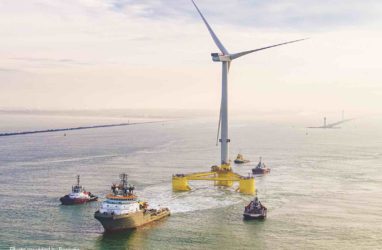Feed aggregator
Why do middle-aged people love birds so much? | Emma Beddington
I have become obsessed from afar with Flaco, an owl who fled a zoo in New York nearly a year ago. Over Christmas, I could no longer resist the urge to track him down
I often wonder why birds speak so universally to the sagging middle-aged soul that it has become a comic trope – the vertiginously swift passage from: “Is that a robin?” to: “There’s a lesser yellowleg two hours’ drive away, start the car.”
Is it the freedom they represent? No cholesterol, no mortgage, no self-assessment tax deadline to worry about? Or a sense of wonder in the everyday miracle of their existence, induced by an awareness of mortality? Whatever it is, I am in deep: disposable income frittered on fat balls; constantly snooping on feathery goings-on in the garden; home decor reminiscent of the Portlandia “put a bird on it” sketch.
Continue reading...Focus on efficiency, not just generation to cut emissions -report
Forest carbon removal could meet a sixth of Japan’s climate commitments, study finds
Expressions of interest, Silvestrum Climate Associates – Remote
Korean securities firm plans foray into voluntary carbon market
Cop29 host Azerbaijan to hike gas output by a third over next decade
Environmentalists condemn news of higher forecast production which is also seen as a conservative forecast
Azerbaijan, which is hosting this year’s UN climate talks, plans to increase its fossil fuel production by a third over the next decade, according to an analysis shared exclusively with the Guardian.
The forecast indicates the Cop29 host will grow its annual gas production by about 12bn cubic metres (bcm) over the next 10 years, which is considered a crucial period in which global leaders must cut fossil fuel production if they hope to limit global heating.
Continue reading...Zinc battery breakthrough as researchers fix spiky crystal problem
 Aqueous rechargeable zinc battery technology inches closer to leaving the lab, after Australian researchers find a way to solve a major corrosion issue.
Aqueous rechargeable zinc battery technology inches closer to leaving the lab, after Australian researchers find a way to solve a major corrosion issue.
The post Zinc battery breakthrough as researchers fix spiky crystal problem appeared first on RenewEconomy.
2023 in review: Australia nears half-way mark to 82% renewables
 Renewables combined to supply an average share of nearly 40% across Australia's main grids for the year. We look back at the stats and records.
Renewables combined to supply an average share of nearly 40% across Australia's main grids for the year. We look back at the stats and records.
The post 2023 in review: Australia nears half-way mark to 82% renewables appeared first on RenewEconomy.
Tanya Plibersek blocks Victorian government’s plan to build wind turbine plant at Port of Hastings
Environment minister says ‘large areas of [wetland] will be destroyed or substantially modified’ by the proposal for windfarm development
Tanya Plibersek has blocked plans by the Victorian government to build a plant to assemble wind turbines for offshore windfarms because of “clearly unacceptable” impacts on internationally important wetlands.
Plans to build the terminal at the Port of Hastings – seen as critical for the state’s strategy to develop an offshore wind industry – included dredging up to 92 hectares (227 acres) of the Western Port Ramsar wetland and reclaiming 29 hectares of seabed.
Continue reading...Big new push for Australian made solar as Tindo pitches $100m module gigafactory
 Australia's first and only homegrown solar panel manufacturer wants to go giga-scale – but says the right federal government support will be crucial.
Australia's first and only homegrown solar panel manufacturer wants to go giga-scale – but says the right federal government support will be crucial.
The post Big new push for Australian made solar as Tindo pitches $100m module gigafactory appeared first on RenewEconomy.
Major blow to offshore wind as critical port project ruled environmentally “unacceptable”
 The new year delivers a major blow to Australia's nascent offshore wind industry, with plans for a critical port hub ruled out by the federal environment minister.
The new year delivers a major blow to Australia's nascent offshore wind industry, with plans for a critical port hub ruled out by the federal environment minister.
The post Major blow to offshore wind as critical port project ruled environmentally “unacceptable” appeared first on RenewEconomy.
How to stop wasting cheap renewables – and drive a faster transition
 The path to 100% renewables is charted. How quickly we get there depends on how we price surplus wind and solar and who controls demand management.
The path to 100% renewables is charted. How quickly we get there depends on how we price surplus wind and solar and who controls demand management.
The post How to stop wasting cheap renewables – and drive a faster transition appeared first on RenewEconomy.
Mouse filmed tidying up man's shed every night – video
Rodney Holbrook, 75, a retired postman, captured footage of a mouse tidying up his workbench after dark. Over a couple of months, he noticed that the things he used during the day were being mysteriously put away at night, so he set up a night-vision camera in his shed in Builth Wells, Powys, Wales, to find out what was happening. He discovered that an industrious mouse was picking up items such as nuts and bolts, clothes pegs and cable ties and tidying them away into a box
Continue reading...Dogs are incredible – if unlikely – allies in conservation
The Guardian view on fare-free public transport: good for people as well as the planet | Editorial
The southern French city of Montpellier is the latest to recognise the benefits of incentivising residents to get on buses, trams and trains
For residents of Montpellier, the new year has brought new travel possibilities. Since just before Christmas, locals have been able to sign up for a free pass to the entire bus and tram network in France’s seventh‑largest city. The majority of a population of 300,000 have, not surprisingly, taken up the offer. Yet the city council is not presenting this as largesse on its part. Rather, says its head of transport, Julie Frêche, it is making the change “because mobility is a right”.
Slowly but surely, the dial on public transport policy across Europe is shifting. The pandemic – and the apparently long-term change to working patterns it triggered – has played a part, as has the cost of living crisis. Prior to both, the environmental need to rely less on cars had already begun to chip away at longstanding assumptions about how we get around.
Continue reading...Drone footage shows Pulborough village submerged in water following Storm Henk – video
Heavy flooding hit the village of Pulborough in southern England after the River Arun burst its banks. Cars were seen driving on a road amid flooded fields in the aftermath of Storm Henk. Major rivers across the UK were flooded as the government issued a further 300 flood warnings. A succession of storms in recent weeks meant prolonged rainfall fell on saturated ground, causing more extreme flooding
Continue reading...Jeremy Hunt’s net zero target claims criticised by climate advisers
Climate Change Committee tells chancellor issuing new oil and gas licenses is ‘inconsistent’ with government’s temperature goals
Jeremy Hunt has been criticised by the head of the independent Climate Change Committee (CCC) over his assurances that the government can still meet its climate targets while allowing companies to extract more oil and gas from the North Sea.
Piers Forster, the interim chair of the CCC, publicly challenged the chancellor on Sunday, after Hunt used predictions made by the committee to defend his government’s oil and gas licensing bill. MPs will vote on the bill on Monday, with several Conservative MPs likely to team up with Labour in voting against it.
Continue reading...UK weather: Storm Henk flooding misery to continue beyond weekend
1,800 properties estimated to have flooded in England, as forecasters warn of colder weather on the way
The misery and chaos caused by flooding in England is set to continue until at least Monday, according to authorities.
In its latest update, the Environment Agency estimated that more than 1,800 properties had flooded after the heavy, intense downpours brought by Storm Henk.
Continue reading...Awash with fossil fuel money, African football is sowing the seeds of its own destruction | David Goldblatt
As Afcon kicks off under an oil firm’s banner, it is a tragic irony that the climate crisis is making the game ever more unsafe to play outdoors
This Saturday, the Africa Cup of Nations (Afcon) – or to give the competition its full title, the TotalEnergies Afcon 2023 – the continent’s biennial international men’s football tournament, will kick off in Ivory Coast. The main point of interest, in the British sports press at any rate, is the impact that this will have on the course of the Premier League, where the leading teams will, mid-season, be losing their African star players for up to six weeks. Less remarked on, perhaps, is that Afcon 2023 is actually being played in 2024, and that its title is so prominently linked to the French hydrocarbon giant.
For more than half a century, the tournament has been played in January and February but, in an effort to placate the needs of a few European leagues and clubs, the Confederation of African Football (Caf) had originally scheduled this edition for June and July 2023. However, those dates coincided with west Africa’s rainy season, and under conditions of climate crisis the region has become more vulnerable to more extreme weather events at this time of year.
Continue reading...


